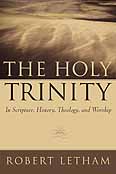
Robert Letham
Reviewed by: J. V. Fesko
The Holy Trinity: In Scripture, History, Theology and Worship, by Robert Letham. Published by P&R Publishing, 2004. Paperback, 551 pages, list price $24.99. Reviewed by Pastor J. V. Fesko.
Robert Letham, the senior pastor of Emmanuel OPC in Wilmington, Delaware, starts out by surveying the biblical data, beginning with the Old Testament, that lead to the doctrine of the Trinity. In the section on historical development, Letham traces the doctrine from the early church, through both the Western and Eastern churches, to John Calvin (1509-64). In the section on modern development, Letham explores the Trinitarian thought of several important contemporary theologians, such as Karl Barth (1886-1968), Karl Rahner (1904-84), Jurgen Moltmann (1926-), and Wolfhart Pannenberg (1928-). In the last section, Letham treats the implications of a Trinitarian understanding of the Incarnation, worship, prayer, creation, missions, and persons.
Letham proficiently explores the relevant biblical texts, but his work truly excels in his discussions of historical development and interaction with the Eastern church. He treats each stage in the development of doctrine evenhandedly. His exploration of the Eastern church's understanding of the Trinity makes the book especially worthy of careful study, as few in the Evangelical church, let alone the Reformed church, are conversant with Eastern Orthodox theology.
There are, however, two weaknesses in this book. Given Letham's Orthodox Presbyterian context, one wonders why there is not greater engagement with Cornelius Van Til (1895-1987); there are a scant two references to his writings. Van Til wrote much on the subject of the Trinity, as is evidenced by Lane Tipton's recent doctoral dissertation on Van Til's Trinitarian thought. There is also no reference to Richard Muller's volume on The Triunity of God in his important four-volume work, Post-Reformation Reformed Dogmatics. Given the glacial speed with which the publishing world moves, perhaps Letham's work had already been submitted by the time Muller's work was released.
These drawbacks aside, Letham's work is to be commended and should be read by all OP ministers and elders. Interested laymen will find it beneficial, though perhaps laborious reading at times, given the necessarily technical terminology - though there is a helpful glossary of terms at the back of the book. This book will equip the reader to articulate his Trinitarian faith, and that is increasingly important as our contacts with non-Trinitarian Muslims increase. Additionally, this book is a needed reminder that we worship a triune God, not merely the Father or the Son. Our worship, Letham rightly argues, should reflect our Trinitarian Lord. Letham is to be applauded for his excellent work on the Trinity.
November 09, 2025
November 02, 2025
October 26, 2025
October 19, 2025
October 05, 2025
Raising Sexually Faithful Kids and
Parenting Boys and Girls in a Gender-Confused World
September 28, 2025
Calvin’s Ecclesiology: A Study in the History of Doctrine
September 21, 2025
© 2025 The Orthodox Presbyterian Church